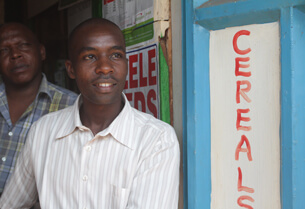On a field visit to two microfinance projects in the Diocese of Thika, Kenya, the Advisory Council of the Anglican Alliance were inspired by the transformative influence of the church in community development.
Two members of the church’s microfinance community initiative explained to the group how the scheme had changed their lives and opened up doors in terms of employment and economic wellbeing.
Msidi Eleanor Daka, from the Anglican Church in Zambia, said, “The microfinance project has excited me and I am encouraged to take this back home, to explore how we can share this good practice and see inspiring outcomes in our own contexts.”
The project is called the Thika Community Development Trust (TCDT) and is supported by the Anglican Micro-Finance organisation, Five Talents UK. The community based initiatives are set up through a series of groups of 6-10 people gathering together to share their savings. On consulting with one another, individual members of the group are given a loan from the wider collective savings, to invest in or set up their own business.
Interest is charged on the loan – much less than commercial banking loans – and the member repays their loan with interest over a set period. In turn other members can then benefit from a loan from the capital fund. The initiatives visited in Thika had developed to such scale that they have established community banks. See here for more information on Five Talents’ approach.
One female member had used the loan to establish her own fashion outlet, selling clothes at reasonable prices to the community. She had been able to pay back her loan in just one year, and built up a confidence and self-reliance that would not have otherwise been possible.
The visiting Advisory Council members commented on the integral role of the church in promoting this development and acknowledged the leadership, community care and innovation that had allowed the church to reach out into its community and promote financial wellbeing.
Economic empowerment opens up a number of doors into other aspects of human wellbeing; education, healthcare and employment are all made possible through increased access to finance.
Jeffrey, a remarkable young man who had set up an animal feed shop with his loan, had been able to employ an assistant to work alongside him, and had bought a motorbike for another employee to aid the transportation of his goods.
Andrew Khoo, a member of the Advisory Council from Malaysia, noted the potential for churchgoers to increase church giving once their businesses were thriving. The church already benefits from the project in receiving dividends from the accumulated interest, and also benefits in non-financial ways through the empowerment of its local community and from the trust invested in the church through the micro-finance project.
Mary, a project facilitator, said, “The project has more impact because it is run by the church. People trust the church and know that the church wants the best for them, and so they are willing to take part in the project even if they are not churchgoers.”
Prior to visiting the projects the group met with the Rt. Revd. Julian Njuguna, Bishop of Thika Diocese, who explained the opportunities and challenges facing the church and the remarkable outreach of the church in development.
The diocese also runs schools, youth outreach programmes, and a Christian bookshop. The Mothers’ Union facilitates a feeding programme and provides regular meals for school children and poorer communities. Advocacy work is undertaken in promoting education around HIV/AIDS, and encouraging action on climate change by facilitating the ‘Farming God’s Way’ programme.
The diocese is linked with the dioceses of Exeter in the UK, and Cyprus and the Gulf in the Middle East. They regularly share their experiences to encourage and learn from each other.
In the picture: Jeffrey at his shop in Thika speaking to the Advisory Council.

